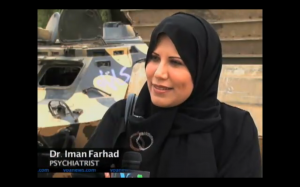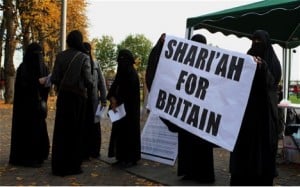This piece was written by a Guest Contributor, Summar Shammakhi.
The interim Libyan leader, Mustapha Abdul Jalil declared Libya liberated on the 23rd October. The content of his twenty or so minute speech was a tribute to the February 17 revolution. He thanked all the brave men and women, all the martyrs, all the injured and all who suffered not only during the eight months of fighting for freedom but for forty two years of extreme imprisonment and oppression.

Jalil’s speech, however, was noted by Western media more on its religious nature than it being a historic speech about freedom, democracy and rebuilding the nation. Jalil made obvious references to Islam, for example saying celebratory gunfire, which causes unnecessary deaths as “forbidden”. He made sure to emphasis “Islamic” banking and said that “Any law that violates Sharia (Islamic law) is null and void legally.” One prominent example was that Jalil announced that previous restrictions on polygamy would be lifted.
BBC news published an objective account describing Jalil’s speech on Libya’s liberation day, titled “Libya’s new ruler’s declare country liberated.” The writer makes a fleeting observation in one paragraph about Islam, including the two examples given by Jalil, Islamic banking and polygamy, but there is no further elaboration on the topic or any mention of fears of Libya becoming an Islamic state. Sky News, on the other hand, approached Jalil’s speech from a different slant, the title being “Beat Gaddafi And Win An Interest Free Wife.” In this article, polygamy is given precedence over liberation. Polygyny is even foregrounded in the title itself. The phrase “interest free wife” plays on the concepts of both Islamic banking and polygyny. The interpretation of polygyny in this article also carries negative connotations, for example the following paragraph:
“What this means is that men can now legally marry more than one woman and do not have to tell each about the other. Lose interest in one wife and you can have another with no penalty. And another.”
Following the statement about polygamy in the Libyan leader’s speech many other articles also focused on the topic too, for example “Libya Liberation Speech Raises Hackles on Polygamy,” “Libyan leader favouring polygamy stirs women’s fears of repression,” and “Hinting at an end to a curb on polygamy, Interim Libyan leader stirs anger,” amongst many others.
Taking into account that the BBC news article was written on the same day the speech was delivered, and the Sky News and other articles were written later on, it is reasonable to infer that no one had expected polygamy to be mentioned in an historic speech about liberation. Liberation day, a day when celebration and happiness is meant to predominate, the little curiosity or anger risen due to the reference to polygamy was probably brushed aside for another day, which could explain the simple description of the event by the writer of the BBC news article mentioned above.
The main concern Western media presents regarding the issue of polygyny centres around women’s rights in Libya. The outcome of polygyny is less favourable for women than it is for men. A CNN report titled “Libyan leader’s embrace of Sharia raises eyebrows” includes Robin Wright’s statement:
“Libyan women are very concerned because the idea of allowing polygamy again or allowing the husband to marry again without asking permission of the first wife is something that will really resonate throughout Libya.”
On a BBC Newshour interview, however, an interview with Khadija Ali, a Libyan journalist for the Tripoli Post, voices her opinion about polygamy in Jalil’s speech in the context of the revolution aftermath. At one point, the interviewer notes that polygamy seemed to be particularly highlighted in the speech and wondered whether it was deliberate. Khadija Ali gave two responses. The first was it might be a way to assure Libyans that Libya will remain true to its Islamic roots, even to the parts the West don’t approve of (responding to the fear of becoming “puppet” government). The second response, which was the direct reply to the interviewer’s question was that no, it was not deliberate, but that even so, the topic of polygamy was in effect quite relevant to the problem facing Libya right now concerning many widows and rape victims. She explained that, in her view, “polygamy will give them the dignity and security from social stigma against rape… We need to cure the whole rape issue and polygamy will go side by side by curing it.”
Moreover, the interviewer asked, “what about this commitment to Sharia or Islamic law, more generally, does that concern you?” Khadija Ali responded, “No, I think speaking in general including myself it’s very natural and as Muslims we expect no less than our country to be ruled by Sharia law.”
A report by Voice of America, titled “Women’s Rights Unclear in Post- Gadhafi Libya,” also interviewed different Libyan women. When asked about lifting restrictions on polygyny, Dr. Iman Farhad, a psychiatrist, states that her husband wouldn’t marry again, but if he is going to take another wife he could do so without her permission. The interviewer then asks “so it’s possible for women to have full rights even in that situation?” in which Dr. Iman Farhad replies “yes, absolutely”. Another Libyan woman, however, says it’s in the man’s right to marry a second or third wife, but he needs to ask permission from his first wife.
In addition, many don’t see lifting restrictions on polygyny as directly affecting women’s rights or improvement of women’s status in Libya. Libyan activist and a housewife, Suad Al Feituri, who runs an organisation ‘Heartfelt Promise’ states “The goal is to raise the standards of Libyan women, for example by teaching them how to operate computers and how to speak English”.
On France 24 Arabic, a Libyan activist Salha Shtewi states that she is not keen on how both the Western and Arabic media have interpreted Jalil’s speech. Shtewi states:
“In regards to the word ‘Sharia’, I have been following what European journalists say about Sharia and they don’t know what Sharia means. They assume Sharia is something against women’s rights or against human rights but it’s actually the opposite.”
Many articles in mainstream Western media have focused on how the Libyan leader’s mention of polygamy might hinder women’s rights and how it has already angered many women. In much of the Western media coverage of this issue, it is clear that Islamic law or Sharia is perceived to be something negative, to be feared. It seems many expected Jalil in his speech to stress pivotal points such as dignity, freedom, democracy, progress and nation building instead of a heavy emphasis on Islam. And yet, as Sana pointed out in her post on the election of the Ennahda party in Tunisia last week, the role of Islam in the political systems of these new governments is much more complicated than is often discussed.











